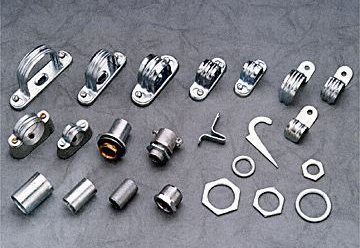 It can be difficult finding the right parts and tools for the specific equipment. The consideration not only lies in the cost of such items, but also in their specifications and features. When it comes to getting the right conduit fitting, how do you know you’re getting the right part?
It can be difficult finding the right parts and tools for the specific equipment. The consideration not only lies in the cost of such items, but also in their specifications and features. When it comes to getting the right conduit fitting, how do you know you’re getting the right part?
Start by knowing the application for the conduit fitting. The application not only dictates the material of the conduit fitting but also the particular features that have to comply with the relevant standards, i.e., the NEC (National Electrical Code) standard. Compliance to such a standard ensures that your components and the installation are done accordingly, guaranteeing quality as well as safety.
Conduit fittings will come in die cast zinc, galvanized steel, nickel-plated brass, nylon, and other such materials. Know that the NEC standard does not exactly specify which material you should be using, just that it has to meet performance criteria. When choosing your material, think about the design and suitability for specific applications.
There are conduit materials designed particularly for liquid tight performance in the petro-chemical industry, the food and beverage business, in waste water treatment, and other industrial applications. Meanwhile, some fittings are suitable for both wet and dry applications, and are generally meant for heating, air conditioning, and various industrial purposes. Other fittings are solely used for electrical applications, such as motorized equipment, HVAC systems, and enclosed power sources.
You can also look for fittings that feature insulated interiors to ensure that no damage is done to the wire as you install. And most fittings will not only be built for easy installation but also manufactured for durability and resistance to harsh environments.
Once you have determined the application and the elements that play into the environment of the fitting (e.g., oil, salt water, and common solvents), you will be able to find the suitable conduit fitting.
Of course, your job is not yet done because then you have to source your fittings, be it metallic conduit or nylon conduits, including the accessories that come with their complete installation. Luckily, you can find a reputable online supplier that offers just about everything you need.
Choose suppliers that provide that one-stop-shopping experience so you don’t have to go to another store for your couplings, mounting brackets, finishing collars, lock nuts, and other essential parts. When you buy your fittings and the corresponding parts to complete the assembly or installation, in one place, you are likely to get a bargain from the supplier.
